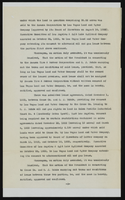Search the Special Collections and Archives Portal
Search Results

Letter from A. M. Folger (Las Vegas) to William Reinhardt, September 11, 1950
Date
Archival Collection
Description
Officer followed up with owners of coolers not equipped with recirculation pumps and issued citations to those still not in compliance.
Text

Letter from A. M. Folger (Las Vegas) to William Reinhardt, July 19, 1950
Date
Archival Collection
Description
Folger reporting that he attended a meeting on possible revisions to a water restrictions ordinance, and that he spoke in opposition to it being repealed.
Text

Letter from A. M. Folger (Las Vegas) to E. E. Bennett (Los Angeles), September 8, 1948
Date
Archival Collection
Description
Detail of some of the costs involved in connecting a new subdivision to the water company mains.
Text

Letter from [A. M. Folger] to Independent Plumbing Company (Las Vegas), August 23, 1948
Date
Archival Collection
Description
Notice of receipt of application to extend water service to a subdivision.
Text

Telegram from Edward C. Renwick (Los Angeles) to G. A. Cunningham (Salt Lake City), April 30, 1959
Date
Archival Collection
Description
The Water District advised that they did not have the facilities to supply enough water to Las Vegas and would not object to the Union Pacific Railroad providing water from its shop well.
Text

Letter from E. E. Bennett (Los Angeles) to R. L. Adamson, November 5, 1952
Date
Archival Collection
Description
Discussion of what the sale to the Water District will mean for taking water from the shop well and water on the Las Vegas Ranch. Reference to proposal draft is noted below.
Text

Letter from E. E. Bennett to Colonel H. F. Clark (Las Vegas), January 4, 1952
Date
Archival Collection
Description
The Nevada state engineer recommended the Las Vegas Valley Water District purchase all 1200 acres from the Las Vegas Land and Water Co., but the District only wanted 679 acres.
Text

Letter from W. H. Johnson (Las Vegas) to Howard W. Cannon (Las Vegas), May 4, 1951
Date
Archival Collection
Description
Mr. Johnson informing the city attorney that the land causing the mosquito problem was the four acre Stewart burial plot, and referred him to the Stewart heirs.
Text


